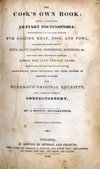DDV CULINARY WEBSITE
CULINARY ARTICLES AND RECIPES
1832 - The Cook's Own Book
Soups
DDV CULINARY

Soups
Every utensil employed in a kitchen must be kept scrupulously clean, and a cook
ought to take especial care that all her saucepans be in good order. Brass pans
are preferable for preserving in, and double block tin are the best sort in use
for every other purpose; their covers, should be made to fit closely, and the
tinning always renewed as soon as it is observed to be wearing off. While new,
they may be easily kept clean by washing them regularly in hot water, and rubbing
on them when quite dry, a little whiting with leather or flannel. After long use,
they will require occasional scouring with fine sand; and before they are used,
they ought always to be rinsed out with hot water, and wiped with a clean cloth.
A landlady will find it good economy, and for her advantage in other respects,
to provide plenty of stone ware and earthen vessels, and also common dishes for
the kitchen, that the table set may not be used to keep cold meat on.
In boiling soup, less water is used in a digester than in a common pot, as in a digester no steam can escape. To extract the strength from meat, long and slow boiling is necessary, but care must be taken that the pot is never off the boil. All soups are better for being made the day before they are to be used, and they should then be strained into earthen pans. When soup has jellied in the pan, it should not be removed into another, as breaking it will occasion its becoming sour sooner than it would otherwise do; when in danger of not keeping, it should be boiled up. It never keeps long with many vegetables in it. The meat used for soups or broths cannot be too fresh. When any animal food is plain boiled, the liquor, with the addition of the trimmings of meat and poultry, make good soups and gravies, as do also the bones of roasted or broiled meat. The gravies left in the dishes answer for hashes, and the liquor in which veal has been boiled, may be made into a glaze by boiling it with a ham bone till reduced to a third or fourth part, and seasoning it with the necessary herbs and spices. In boiling weak soups, the pan should be uncovered that the watery particles may escape. Cow-heel jelly improves every sort of rich soup; and for thickening, truffles, morels, and dried mushrooms, may be used with advantage. Directions are given with each of the following soups for thickening with flour and butter, cream and eggs; after the cream and eggs are added, the soup must not be allowed to boil. Should brown gravy or mock turtle soup be spoiling, fresh-made charcoal, roughly pounded, tied in a little bag and boiled with either, will absorb the bad flavor and leave it sweet and good. The charcoal may be made by simply putting a bit of wood into the fire, and pounding the burnt part in a mortar. |